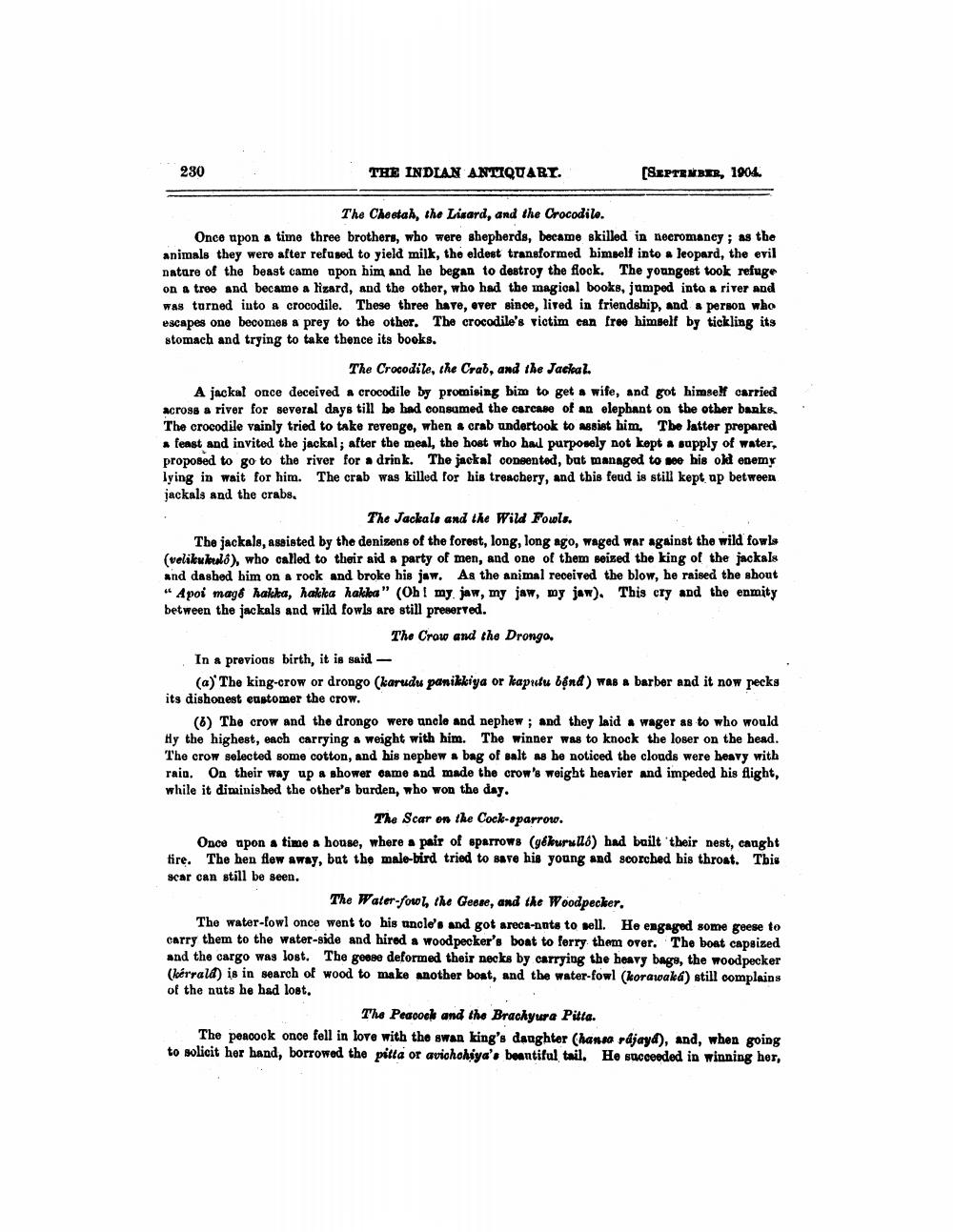________________
230
THE INDIAN ANTIQUARY.
[SEPTEMBER, 1904.
The Cheetah, the Lizard, and the Crocodile.
Once upon a time three brothers, who were shepherds, became skilled in necromancy; as the animals they were after refused to yield milk, the eldest transformed himself into a leopard, the evil nature of the beast came upon him and he began to destroy the flock. The youngest took refuge on a tree and became a lizard, and the other, who had the magical books, jumped into a river and was turned into a crocodile. These three have, ever since, lived in friendship, and a person who escapes one becomes a prey to the other. The crocodile's victim ean free himself by tickling its stomach and trying to take thence its books.
The Crocodile, the Crab, and the Jackal.
A jackal once deceived a crocodile by promising him to get a wife, and got himself carried across a river for several days till he had consumed the carcase of an elephant on the other banks. The crocodile vainly tried to take revenge, when a crab undertook to assist him. The latter prepared a feast and invited the jackal; after the meal, the host who had purposely not kept a supply of water, proposed to go to the river for a drink. The jackal consented, but managed to see his old enemy lying in wait for him. The crab was killed for his treachery, and this feud is still kept up between jackals and the crabs.
The Jackals and the Wild Fowls.
The jackals, assisted by the denizens of the forest, long, long ago, waged war against the wild fowls (velikukulo), who called to their aid a party of men, and one of them seized the king of the jackals and dashed him on a rock and broke his jaw. As the animal received the blow, he raised the shout "Apoi magé hakka, hakka hakka" (Oh! my jaw, my jaw, my jaw). This cry and the enmity between the jackals and wild fowls are still preserved.
The Crow and the Drongo.
In a previous birth, it is said -
(a) The king-crow or drongo (karudu panikkiya or kaputu band) was a barber and it now pecks its dishonest customer the crow.
(6) The crow and the drongo were uncle and nephew; and they laid a wager as to who would Hy the highest, each carrying a weight with him. The winner was to knock the loser on the head. The crow selected some cotton, and his nephew a bag of salt as he noticed the clouds were heavy with rain. On their way up a shower came and made the crow's weight heavier and impeded his flight, while it diminished the other's burden, who won the day.
The Scar on the Cock-sparrow.
Once upon a time a house, where a pair of sparrows (gékurulló) had built their nest, caught fire. The hen flew away, but the male-bird tried to save his young and scorched his throat. This scar can still be seen.
The Water-fowl, the Geese, and the Woodpecker.
The water-fowl once went to his uncle's and got areca-nnts to sell. He engaged some geese to carry them to the water-side and hired a woodpecker's boat to ferry them over. The boat capsized and the cargo was lost. The geese deformed their necks by carrying the heavy bags, the woodpecker (kérrald) is in search of wood to make another boat, and the water-fowl (korawaka) still complains of the nuts he had lost.
The Peacock and the Brachyura Pitta.
The peacock once fell in love with the swan king's daughter (hansa rájayd), and, when going to solicit her hand, borrowed the pitta or avichchiya's beautiful tail. He succeeded in winning her,




